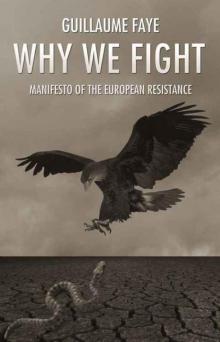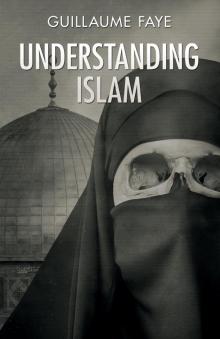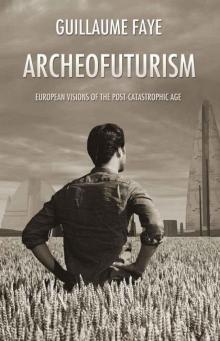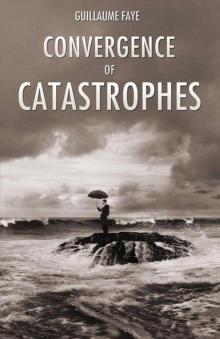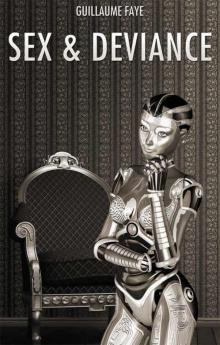Why We Fight, page 13




Ecological ruptures are likely to occur in the following realms: rising temperatures, desertification, deforestation, the exhaustion of fishing and agricultural reserves, the spread of viral diseases, pollution of the seas and freshwater sources, etc. Destruction in each of these realms weighs on all the others and compounds their severity.
As to ecologism, it’s a pseudo-ecology. It’s a front to conceal Trotskyism’s cosmopolitan agenda. The Greens oppose nuclear power, which is the least dangerous and least polluting of energy sources. In France and Germany their policies objectively favour the oil lobby. Their principal concern is the Third World repopulation of Europe. These ecologists are nothing but impostors.
Ecology also needs to include biopolitics, social policy, and demography. A real ‘ecological society’ would obey principles related to maintaining natural equilibriums, the ethno-cultural homogeneity of the population, as well as its public health.
But how is it possible to reconcile ecology and the requirements of economic and industrial power, particularly in Europe? This is the central question. Without productivism, there’s no military independence, no industrial creativity, no dynamism. Anti-productivism, ecological fundamentalists refuse to see, is an appendage of speculative capital, for it disfavours the national labour market (in the form of outsourcing, financialisation, etc.), and instead favours the beneficiaries of various state handouts and other such parasites at the expense of our own producers and entrepreneurs. There is, however, an ecological productivism.
Someone truly concerned about ecology doesn’t ask, ‘How is it possible to produce less in order to pollute less?’, but, ‘How is it possible to produce better while polluting less?’ The answer entails both a rupture with the unified planetary model of ‘development’ and an archeofuturist turn to a ‘two-tier’ economy.
European economic power is perfectly compatible with environmentalism. On the condition that there’s a political will recognising the importance of electronuclear energy (the least polluting energy source), that this will progressively abandons the oil economy, makes use of piggyback trains, electrifies automobiles, introduces canals and other low-polluting forms of transport. Utopia? Yes, within the present framework, which lacks such a will. No, within the scope of a revolutionary project, which might follow the post-catastrophe, the post-chaos. It’s a matter of substituting an ‘economy of power’ [133] for a ‘market economy’.
(see convergence of catastrophes; economy, organic; economy, two-tier)
* * *
Economism
The reduction of social and political goals to their economic dimension, characteristic of Western ideologies.
Economism is an offshoot of the classical liberal doctrines of the Seventeenth and Eighteenth centuries and was later extended to socialist doctrines of Marxist inspiration. Its central objective is a policy of ‘economic development’, quantitative production, pursued without regard to cultural, ecological, ethnic, etc., imperatives. It reduces human happiness to a matter of living standards; it pursues economic ‘growth’ for the sake of short-term interests; and it neglects, among many other things, the conditions necessary for demographic renewal. It believes a country’s health is measured solely by its economic performance. From a long-term perspective, economism actually weakens economic power, because it ignores the external forces affecting it: such as political independence, resource availability, birth rate, etc.
From the viewpoint of economism, history is explainable solely in terms of economic factors, which are seen as facets of a civilisation’s infrastructure, while cultural, demographic, and other factors are ignored or treated as secondary.
(see society, market)
* * *
Economy, Organic
A ‘third way’ economic model, which takes the path neither of liberal capitalism nor statist socialism.
An organic economy arises on the precept that the economy ought to function as a living organism, hierarchical and harmonious, subordinated to the political, and not to a cold, lifeless mechanism animated by socialist dogmas or the capitalist logic of short-term profit. An organic economy would put finance in service to production and production in service to the people. It would organically integrate entrepreneurial dynamism, social justice, as well as ethnic, cultural, and ecological imperatives in an almost biological way, endeavouring to reconcile the best of the liberal market and the planned economy.
The principal features of an organic economy would:
1. Refuse globalism’s free trade ideology in favour of the autarky of great spaces, i.e., it centres the economy within a designated civilisational region, without abolishing world trade and international financial exchanges, but at the same time ensuring that foreign trade is normalised, limited, and subject to quotas and other restrictions.
2. Refuse statist socialism, paralysing fiscalism, administrative obesity, and privilege a free competitive market within a self-centred, protected, and regulated market.
3. Regionalise production and exchange within Europe.
4. Respect ecological imperatives, which are to be understood as being more important than short-term profits.
5. Invest in great public works.
6. Coordinate planning and the market.
7. Refrain from intervening in the economy except in a political manner — to establish the economy’s fundamental norms and to consider its general needs, but not to administratively dictate its details.
8. Abandon direct progressive taxes for the sake of deducting a small percentage from each income source, whatever it may be, in order to lighten the burden on society’s vital forces and improve its overall production.
9. Allow the state, not the hazards of the market, to make monetary policy, unlike the present forces affecting the euro.
10. Oblige those receiving unemployment benefits to work for the sake of the collective or to accept whatever alternative employment is proposed.
11. Restrict the employment of foreigners and deny them welfare.
12. Endeavour, more generally, to eradicate poverty and misery without recourse to centralised, socialist bureaucratic methods that have totally failed, and adopt a policy of social assistance, assumed at local and regional levels, for citizens in need.
An organic economy is imaginable only within a protected European market. It would, as such, refuse both reckless globalisation and a statist, taxing socialism, while accepting the market whenever its standards are set by the sovereign authority. It would also subordinate finance to production and production to the political, whereas today the very opposite is the case. Similarly, it would subordinate the currency to political imperatives, not the hazards of speculative markets as it is with the euro.
The organic economy is a doctrine of temperance. It treats the economy as the ‘third function’, subordinating it to the political, and freeing it thus from both statism and market anarchy. The organic economy reconciles the dynamism and synergy of all social functions, so that one function is not impaired by another.
Paradoxically, the United States, where the state is equipped with a strong political will to pilot a free, dynamic, private economy, is closer to an organic economy than Europe.
(see autarky of great spaces; economy, two-tier)
* * *
Economy, Two-Tier
The eventual organisation of the world economy into two parallel systems, one of which will take the form of a non-industrial, neo-traditionalist form of economy, while the other retains aspect of the present techno-scientific economy.
Only such a system can preserve the ecosystem and avoid the impending world economic catastrophe, especially given Asia’s rapid industrialisation. There is, however, little chance of setting up such a system, since it would clash with the inviolable dogma of ‘development’. It’s probable, though, that the revolutionary alternative of a two-tier economy will be imposed by the economic and ecological catastrophes of the early Twenty-first century.
A two-tier economy presupposes that most of humanity will return to a subsistence economy with low energy needs, while the technological economy continues within certain restricted zones. These two economies would cohabit within a single country. Such a model, however, is something of a ‘wager’, unthinkable in the present situation — based, as it is, on the hypothesis of the mid-term unviability of the present world economy and its eventual termination in a catastrophic crisis.
(A more extended treatment of this concept is developed in my Archeofuturism.)
* * *
Egalitarianism
This central dogma of Western ideologies stems from a secularisation of Judaeo-Christian claims that all men are in essence equal, atoms of moral, political, and social equivalence — and that equality needs to be realised in fact.
Egalitarianism is the trunk root of the dominant ideology. It is the source of all modern totalitarianisms, as well as the decadence of so-called liberal, democratic societies. It’s based on a pathological refusal to accept the inegalitarian nature of human societies — that is, it’s a utopian revolt against life itself. Egalitarianism derives from Judaeo-Christian individualism — or, said more exactly, it’s a perversion and secularisation of this individualism. We shouldn’t forget, though, that the egalitarian virus is also found in non-Christian conceptions of the world and that Medieval Christianity knew how to protect itself from it.
Judaeo-Christianity presupposes that men as individuals are equal before God, that this equality is superior to their differences, to objective inequalities and ethnic attachments. This purely theological and metaphysical view of the world was secularised by the Enlightenment — allegedly ‘anti-Christian’, but in actuality ‘post-Christian’.
In the course of the Nineteenth and Twentieth centuries, egalitarianism evolved from demanding equality of opportunity to demanding equality of results, given the impossibility of actually establishing such a society. Refusing aristocratic principles, which it failed to eliminate, egalitarianism everywhere promotes false elites. It renders natural inequality insupportable, effectively favouring either the law of the jungle or a pervasive bureaucratic tyranny. In refusing an organic, hierarchical vision of society, egalitarianism gives rise to new inequities and does so in the name of justice. To affirm that men are unequal by nature is not an injustice, but a recognition of what is. As Aristotle put it, ‘Justice is based on the observation of things’.
Egalitarianism stems from the perverted spirit that seeks to transform Judaeo-Christian spiritual equality before God into a forced equality before the contingencies of daily life. Ancient Graeco-Roman conceptions of the world, like those of contemporary India, avoided the illusion that men are equivalent, because they rested on a realistic vision of a polycentric, differentiated, and naturally hierarchical universe. Egalitarianism, on the other hand, makes us believe that hierarchy is inherently unjust, though it can’t get rid of it, since it’s part of the nature of things; instead, it denies it, creating in its place even more savage forms of inequality. Egalitarianism is an institutionalised lie. It’s the most humble, paradoxically, who are hurt the most by its imposture, since everywhere the right of excellence is denied and everywhere mediocrities and scoundrels are favoured.
Egalitarianism fails to understand, indeed it despises, the human race, for it privileges a completely abstract conception of man. It leads thus to the astonishing idea that ‘everything is to be valued’, that the crook has as much right — if not more — than an honourable man, that minor art works are as important as the great works, that the most developed civilisations are no better than savage tribes (‘ethnopluralism’), that the citizen has no more rights than the alien, etc. Its days, however, are numbered, for egalitarianism wars on human nature.
In denying differences, as well as individual and collective inequalities — and in treating Man as something almost metaphysical — the West’s dominant egalitarian ideology has produced a totally schizophrenic consciousness. On the one side, the dogma of natural equality, on the other, the blind reality of the natural inequalities of individuals and peoples. It’s perfectly logical, then, that egalitarianism, based on an anthropological lie, culminates in social injustice and totalitarianism.
Egalitarianism is the source of all the evils and the illusions of the modern world. Its perverse, metaphysical, anthropocentric core deifies man and separates him from the animal realm (anthropocentrism). As Spencer[134] and Darwin have shown, the human race is bound like every other animal species to the central fact of existence: inequality. This doesn’t mean that religious issues or man’s spiritual, cosmic dimensions are out of the question, but, as Evola saw, it does mean that men are unequal and lack an intrinsic metaphysical unity.
(see individualism)
* * *
Elite, elitism
The elite is that social category responsible for society’s management, ‘chosen’ or ‘elected’, as its etymology suggests. Elitism designates the doctrine promoting the selection of the best, not according to birth, but according to objective capability.
Very close to the notion of ‘aristocracy’, the notion of ‘elite’ has likewise degenerated in contemporary society. Elites now lack aristocratic qualities, that is, they don’t comprise ‘the best’, and traditional aristocrats (except for certain exceptions) no longer belong to it, having long ago been neutralised.
Contemporary elites are ‘recruited’ according to criteria that have nothing to do with excellence or character. These criteria are now nepotism, connection, membership in a lobby, a clique, a mafia, a clan (sociological or ethnic); or else these criteria relate to the ability to make money. The elites of contemporary society are no longer selected, but recruited on the basis of corporate or market principles.
Recruitment is thus no longer on the basis of competitive criteria or of excellence. This blocks the circulation of elites. Two phenomena contribute to this: first, egalitarianism and an educational lack of discipline that no longer allows the best to advance; and second, the dominant ideology’s aversion to ‘elitism’, meritocracy, or selection, all of which have become taboo since May ‘68. Selection and inequality nevertheless still occurs, it’s human nature. The present system of elite-formation is chaotic and unjust. And anti-elitism leads to the social jungle.
(see aristocracy; circulation of elites, meritocracy; selection)
* * *
Empire, imperial federation
The political unification of diverse but related peoples under a common sovereign authority, which leaves each individual people autonomous and free.
A federated empire is united, but not blindly homogenised, like the egalitarian nation-state. It revolves around the function of sovereignty, while preserving the diversity of its other functions. Its existence is legitimated by the power and longevity of its peoples, federated within a political and historical community. The empire’s vocation is not to become a ‘World State’, like Islam or the American System, but instead embraces and guides the destiny of those peoples who historically, culturally, and ethnically feel themselves to be part of the same general community.
There’s also a negative conception — a suicidal conception — of empire. This is the model of the late Roman Empire, following the edicts of Caracalla[135] (who granted Roman citizenship to all the Empire’s subjects, whatever their origins); this is the model of Alexander, who sought a single ensemble of Greeks and Orientals; this is also the model of Europe’s former colonial empires, which is today colonising Europe itself. The ethnopluralist, multi-racial model of empire must be rejected, for it inevitably stirs up internal dissension and, ultimately, ends up destroying the empire’s founding stock.
The sole positive conception of Empire is that which doesn’t oppose the idea of Nation — in the Roman sense of ‘being natives of the same great people’. Empire is a federation of ethnically related peoples — a Grand Federal Nation, of sorts. A true model of empire. The Empire is not a ‘nation-state’, both cosmopolitan and centralised, but an ensemble of free nations ethnically, culturally and historically related, federated in a great continental empire. The idea of Empire is not admissible, however, if it’s a universalism whose drift is toward a ‘World State’.
In this sense, Empire is a decentralised Federation, equipped with a strong central power yet restricted to certain specific domains and regulated according to principles of subsidiarity:[136] as such, this power addresses the domains of foreign policy, border control, general economic and ecological rules, etc. The imperial principle is not one of homogenisation; its various components are autonomous and can be organised in different ways, according to their own internal policies (regarding justice, institutions, fiscal autonomy, education, language, culture, etc.). The Empire maintains the ensemble’s unity and the general civilisational project — but it’s not to be seen as a fluid, confederated association, totally heterogeneous, open to all the world: a discipline of the whole is necessary, to imbue it with a firm, central, clear direction. In this sense, the present European Union, this will-less administrative aggregate, is far from representing the European imperial idea.
The national (or regional) components of the empire would be imbued with a ‘probationary freedom’ that accepts the ‘grand policy’ of the ensemble and the sovereignty of its central power, but this power, in exchange, would concede their specific identities, accepting that each nation or region, in conserving its freedom, has the right to leave the Federation at any moment. The notion of Empire presupposes a collective project and longevity in history. Europe would provide an ideal frame in which to constitute an Empire, for it would regroup all Europeans, in their diversity and their unity. To realise a future ‘Eurosiberian Empire’, including Russia, Europeans will have to decide if the federation is going to be based on the nation-state or the historic region. But whatever their response, the idea of imperial Federation seems, in the end, the sole way by which Europe will be saved.

